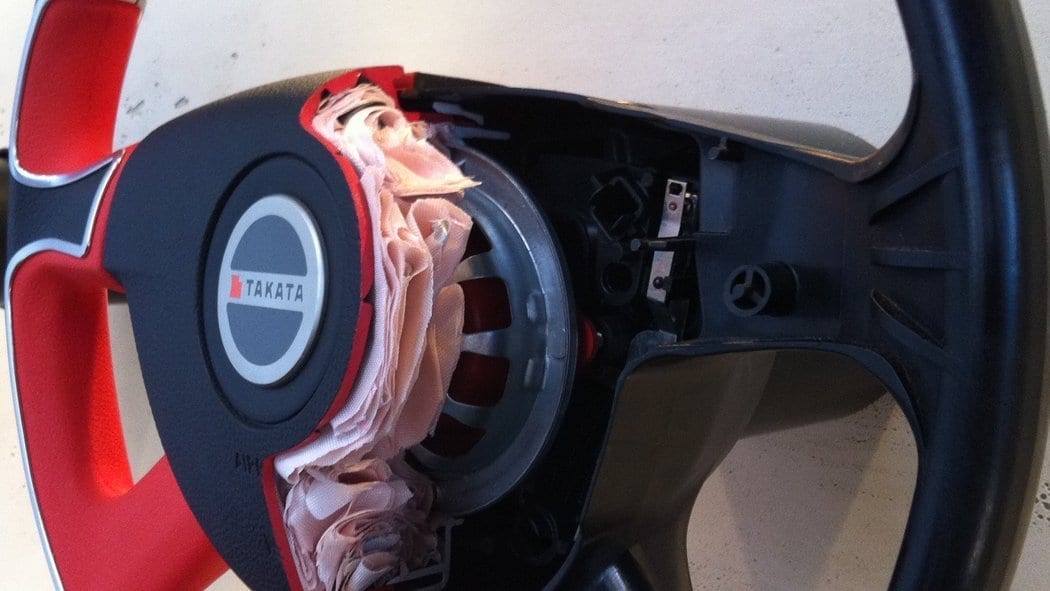Most auto manufacturers advise the dealers to provide a loaner car at no extra charges if you need alternative transportation.
If you own a vehicle that was manufactured after 2001, chances are you may be affected by the Takata airbag recall. The Japanese firm and the NHTSA revealed that most of the affected units include the older ones in areas that are prone to extreme temperatures and humidity.
For example, Ford advised its customers to stop using some 2006 Ford Rangers and to visit their dealers immediately for replacements as the units were at a higher risk of rupturing after a crash. The danger could be in front of you. Tens of millions of cars from more than 30 auto manufacturers have been affected. The supplier of the airbags noted that the devices had defective components.
This was after noticing that they could explode without warning. After an explosion, the airbags may send metal shrapnel into the vehicle’s occupants, causing serious injuries or even death. The leading vehicle brands have been issuing recalls one after another over time. In 2016, Toyota said that more than 300,000 other vehicles had been affected by the recall.
Before the Takata-airbag recall—one of the biggest automotive recalls in history—15 million cars had already been recalled as they were prone to the airbag problem. On the other hand, Honda issued a report assuring the customers that it would address all their concerns and that its customer service team was ready to offer the help they needed to fix the faulty airbags.

In early 2016, NHTSA offered BMW five more months to complete airbag repairs for its customers. General Motors revealed that it recalled over 3,000 units to replace their airbags. The NHTSA gave all the major car manufacturers a deadline to ensure all the fixed cars were fixed. However, in January of 2020, an additional 10 million vehicles were recalled.
Car owners were required to contact their dealers for help as soon as possible. The drivers of the affected vehicles are eligible for free repair services. While this may be inconvenient, it is a great way to improve your safety while behind the wheel. You can consult your dealer about the assistance you can get while your unit is being repaired.
Should I Still Drive My Car If It Has a Recalled Airbag?
Yes. Note that even devices that have already been recalled can still reduce the chances of injuries and save lives. Most Takata airbags are effective. Even if the risk they pose is low, it is important to acknowledge. According to reviews from some car manufacturers, the chances of inflator ruptures are low, and most of them will perform as expected.
The duration of the repairs will depend on the type of vehicle. If your unit is affected by the recall, the notice letter will describe the necessary repairs and show how long it will take to complete. Once you have received the letter, you should schedule an appointment with your dealer.
Most parts for all affected units are readily available and often take less than 12 hours. Most auto manufacturers advise the dealers to provide a loaner car at no extra charges if you need alternative transportation. If your dealer offers this option, you will only pay for fuel and insurance coverage.
The Involvement of NHTSA in Takata Airbag Recalls
The Federal agency oversees the recalls and communicates with manufacturers of the affected units regularly. One of the techniques it has been using to facilitate the process is using an Independent Monitor. Some of the tools used during the work include in-person appointments and telephone calls.
All vehicle manufacturers are required to provide regular updates on the process of airbag repairs, the availability of the necessary parts, and strategies being implemented to ensure faster completion rates. The federal body doesn’t hesitate to use its powers to improve public safety to inform stakeholders about expectations.


Join the conversation!